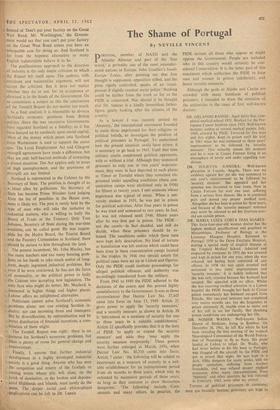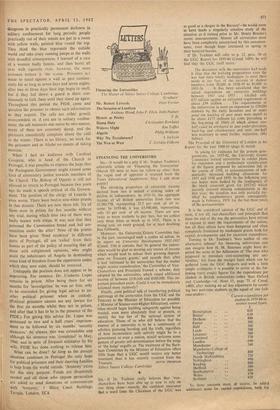The Shame of Portugal
By NEVILLE VINCENT pORTUGAL, member of NATO and the Atlantic Alliance and part of the 'free world,' is probably one of the most imisunder- stood nations in Europe. J-ohn Gunther's Inside Europe Today, after pointing out that free thought is suppressed, opposition stifled, and the. press rigidly controlled, speaks of an 'omni- present if slightly comical secret police.' Nothing could be farther from the truth so far as the PIDE is concerned. Nor should it be thought that Dr. Salazar is a kindly benevolent father- figure, gently looking after the citizens of the country.
As a lawyer I was recently invited by 'Amnesty,' the international movement founded to assist those imprisoned for their religious or political beliefs, to investigate the position of political prisoners in Portugal. To understand how the present situation could have arisen, it is necessary to go back to 1945. Until that time military courts condemned political opponents, with or without a trial. Although they sentenced prisoners to only one or two years' imprison- ment, they were in fact deported to such places as Timor or Tarrafel where they remained im- prisoned under appalling conditions (these con- centration camps were abolished only in 1936) for fifteen to twenty years. I met someone whose experience was typical of many. When a uni- versity student in 1931, he was put in prison for political activities. After four years in prison he was tried and sentenced to two years. In fact, he was not released until 1946; fifteen years after he was first put in prison. The PIDE- not the courts—in fact decided, and still do decide, when these prisoners should be re- leased. The conditions under which these men were kept defy description. No kind of torture or humiliation was left undone which could have been done in these concentration camps located in *the tropics. In 1946 two special courts for political cases were set up in Lisbon and Oporto. Only the PIDE could institute proceedings for alleged political offences, and authority was accordingly transferred from the military.
From 1945 to 1949 the PIDE adhered to the decisions of the courts and this proved highly unsatisfactory to the Government. It-was in those circumstances that Decree Law No. 37,447 came into force on June 13, 1949. Article 21 gives power to apply the 'security measures,' and a security measure as shown in Article 20 is 'internment as a measure of security for one ' to three years in a suitable establishment.' Article 22 specifically provides that it is the duty of PIDE `to apply or extend the security measure' and adds they 'may apply the security measure temporarily.' These powers were further enlarged in March, 1956, when Decree Law No. 40,350 came into force. Article 7 states: 'the following will be subject to internment as a measure of security in a suit- able establishment for an indeterminate period from six months to three years, which may be extended by successive periods of three years, as long as they continue to show themselves dangerous.' The following' include Com- munists and many others. In practice, the PIDE include all those who oppose or might oppose the Government. People are included who in this country would certainly be con- sidered Conservative. It is the latter part of this enactment which authorises the PIDE to keep men and women in prison indefinitely, and hence 'security measures.'
Although the gaols at Aljube and Caxias are crowded with many hundreds of political prisoners, I intended to draw the attention of the authorities to the cases of four well-known doctors : DR. ORLANDO RAMOS: Aged thirty-five, com- pleted medical school 1951. Worked for the Por- tuguese Cancer Institute since 1955. Well-known lecturer; author of several medical papers. July, 1960, arrested by PIDE. Tortured for five days and five nights. Kept in prison until his trial in 1961 when he was sentenced to three years' imprisonment to be followed by 'security measure.' This virtually means life sentence and he is now in Caxias Fortress living in an atmosphere of terror and under appalling con- ditions.
DR. JULIETTA G ANDRA : Well-known physician in Luanda, Angola. There was no evidence against her yet she was sentenced to one year's imprisonment to be followed by 'security measure.' She appealed and her sentence was increased to fout years. Now in Caxias Fortress for over one year, suffering from a serious liver disease. She is in continual pain and denied any proper medical care. Altogether she has been in prison for three years, and because of the 'security measure' sentence may never be released to see her fourteen-year- old son outside prison.
DR. MARIA LUIZA COSTA DIAS SOARES: This forty-four-year-old woman doctor has the highest medical qualifications and practised in Mozambique. Professor of Biology at the Lourenco Marques Hospital. Returned to Portugal 1950 to the Dona Estefania Hospital, making a special study of tropical diseases at the Tropical Medical School. Admired and respected by everyone. In 1953 she was arrested and kept in prison for one year, when she was released, not having been convicted of any offence. In 1958 she was again arrested and sentenced to two years' imprisonment and 'security measure.' It is widely believed that she was only arrested because her husband had escaped. She appealed with no effect. Whilst she was receiving medical attention in a Lisbon hospital the PIDE brought her back to Caxias prison immediately her husband escaped from Peniche. Her two-year sentence was completed over twelve months ago, but she languishes in prison extremely ill, unable even to move out of her cell to sec her family. Her shocking prison conditions are endangering her life.
DR. NOSHIR WADIA: Well-known Indian Doctor of Medicine, living in Bombay. On December 18, 1961, he left Rio where he had been attending the first meeting of the tropical Neurological Commission of the World Federa- tion of Neurology to fly to Paris. His plane landed in Lisbon to refuel. Dr. Wadia, who had never before in his life been to Portugal, was dragged off the aircraft by the PIDE and put in prison that night. He was kept in a dark, filthy dungeon for many weeks, with no proper sanitation, suffering from tracheo bronchitis, and was refused proper medical treatment. After many representations, front 'Amnesty' and other quarters, he was released in February, 1962, soon after my arrival
Torture of political prisoners is common; men are brutally beaten; prisoners are kept in dungeons in practically permanent darkness in solitary confinement for long periods; people practically out of their minds are put in a room with yellow walls, painted blue round the top. They think the blue represents the outside world and take crazy running jumps at the walls With dreadful consequences. I learned of a case ot a Woman badly beaten, and then burnt all over with cigarette ends, however, the most common torture is the statue. Prisoners a: e made to stand against a wall or post continu- ously for as long as seven days and seven nights; after two or three days their legs begin to swell, but if they fall down a guard is there con- tinuously to kick them until they stand up again. Throughout this period the P1DE come and question the prisoner to obtain such information as they require. The cells are either grossly overcrowded, or, if you are in solitary confine- ment, the cell measures one metre by two metres; many of these are extremely damp, and the prisoners consistently complain about the cold Li the winter. There is no library, no work for thc prisoners and in Aljube no means of taking exercise.
When I had an audience with Cardinal Cerejeria, who is head of the Church in Portugal, it was possible to express the hope that the Portuguese Government might extend some kind of elementary justice towards members of the Church. The Bishop of Oporto is still not allowed to return to Portugal because two years ago he made a speech critical of the Govern- ment. The position of the clergy of Luanda is even worse. There were twelve non-white priests in that diocese. There are now three left. Six of them were in prison for five months without any trial, during which time two of them were badly beaten with whips. It was said that they Poisoned the Communion bread and hid am- munition under the altar! Nine of the priests have been given 'fixed residence' in different parts of Portugal, all are 'exiled' from their homes as part of the policy of ensuring that all those with enlightened opinions, who might assist the inhabitants of Angola in demanding some kind of freedom from the oppression under Which they now exist, should be removed.
Unhappily the position does not appear to be improving. For instance. Dr. Umberto Lopes remains in prison. After being there for six months for 'investigation' he was set free, only to be rearrested for giving legal advice to an- other political prisoner when in custody. (Political prisoners cannot see any lawyer for the first six months whilst they are in prison, and after that it has to be in the presence of the P1DE.) For giving this advice Dr. 1.opes was sentenced to two and a half years' imprison- ment to be followed by six months' security measures.' As always, this was extendable and although his sentence was 'Completed' in May, 1960, and in spite of frequent entreaties by his Wife, PIDE has done nothing to release him.
What can be done? So long as the present situation continues in Portugal the only hope for political prisoners and their starving families is help from the world outside. 'Amnesty exists for this very purpose. Funds are desperately needed and all those who oppose persecution are asked to send donations or communicate With 'Amnesty,' 1 Mitre, Court Buildings, Temple, London, EC4.



































 Previous page
Previous page